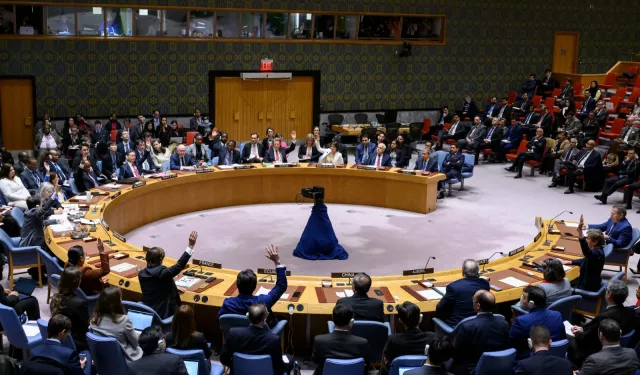Hamas has called on Russia and China to veto a US-backed UN Security Council resolution that endorses former President Donald Trump’s Gaza plan, a proposal the group warns would entrench Israeli control and lead to foreign military intervention. The vote is scheduled for Monday.
A senior Hamas official told Al Manassa that the group’s external office contacted Moscow and Beijing to highlight what it described as dangerous flaws in the American draft plan, which is being supported by several Arab states.
The official, who spoke on condition of anonymity, told Al Manassa that while Hamas is lobbying for a veto, growing regional support for the US proposal may undermine those efforts.
The draft, according to a version seen by Agence France-Presse, calls for establishing an international “Board of Peace” to act as a transitional governing body in Gaza through 2027.
It also proposes deploying an “International Stabilization Force” that would coordinate with Israel, Egypt, and a newly trained Palestinian police force to secure borders and oversee disarmament efforts.
Russia has presented a counter-resolution recognizing a Palestinian state and omitting both the peace council and immediate troop deployment. The two competing proposals have split Security Council members, with intense negotiations expected in the days ahead.
A joint statement issued Friday by the United States and regional partners—including Egypt, Qatar, Saudi Arabia, the UAE, Turkey, Jordan, Pakistan, and Indonesia—urged swift adoption of the US draft, calling it a “viable path toward peace and stability” for Palestinians, Israelis, and the broader region.
But for Hamas, the plan grants Israel unchecked authority to operate within Gaza’s so-called “yellow line,” allows an international force to enter areas under Palestinian or Hamas control, and risks direct clashes with its fighters. “These provisions are vague and do not guarantee meaningful outcomes,” explained the Hamas official, calling the US text “hollow.”
The revised US draft now emphasizes a ceasefire, adds a conditional path toward Palestinian statehood if the Palestinian Authority undergoes reforms overseen by the “Board of Peace,” and outlines a phased Israeli withdrawal based on progress in disarmament. It also drops punitive language targeting humanitarian organizations.
Russia and China have expressed reservations about the US draft. Russia's proposal and calls on the UN secretary-general to propose implementation mechanisms, including assessing whether a peacekeeping force is viable.
In a statement, the Russian UN mission said its alternative draft seeks to “amend the US concept so as to bring it into full conformity with long-standing and previously agreed decisions of the UNSC”. The American proposal, according to the statement, does not adequately address fundamental issues regarding Palestine “first and foremost the two-State solution for the Israeli-Palestinian settlement.”
The US draft aligns closely with Israeli policy, which opposes the establishment of a Palestinian state based on the 1967 borders as stipulated in UN Resolution 242. While Trump’s administration avoided outright rejection of the two-state solution, it routinely advanced positions—such as expanding Israeli territory and envisioning Gaza as the “Middle East Riviera”—that undermine it.
US Ambassador to the UN Mike Waltz, in an op-ed published in The Washington Post, warned that rejecting the American resolution would amount to “a vote either for the continued reign of Hamas terrorists or for the return to war with Israel.”
The Hamas official also confirmed to Al Manassa the group received communications regarding a possible meeting between US envoy Steve Witkoff and senior Hamas negotiator Khalil Al-Hayya, signaling mounting diplomatic pressure on the movement to accept the US-backed plan.
Supporters of the resolution argue that Trump’s plan represents a rare and serious attempt to revive a political track long paralyzed by violence and diplomatic inertia. It gained traction following a summit in Sharm El-Sheikh last month, where key Arab states endorsed the proposal.
The Security Council vote is expected to be a defining moment—not only for Gaza’s future, but for the trajectory of the broader Israeli-Palestinian conflict. With vetoes looming and alliances shifting, the outcome remains deeply uncertain.
